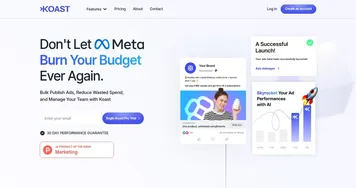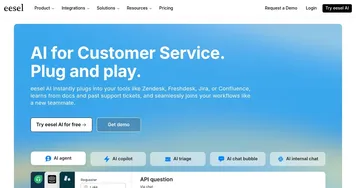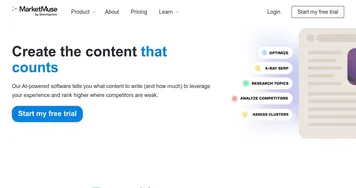Rep AI

Folks, if you’ve ever watched a potential customer wander your online store like a ghost in a fog, poking at products but vanishing before checkout, Rep AI steps in as that sharp-eyed clerk who knows just what to say. It chats up visitors in real time, nudging them toward buys with spot-on suggestions based on their browsing habits, and yeah, it feels almost spooky how well it reads the room without being a room at all. I mean, think about it, your site suddenly has this tireless sidekick handling the small talk that turns into big sales, all while you sip coffee somewhere else.
Now, let’s get into the guts of what makes Rep AI tick for Shopify merchants. The core engine pulls from your catalog with one click, syncing everything so the bot can riff on inventory like it’s flipping through a Rolodex from the future. Features like Product Finder don’t just spit out keyword matches, they grasp the vibe of the conversation, say a shopper mumbles about “cozy winter boots for rainy days,” and boom, it serves up fur-lined options with weather-proof soles, complete with why-they-fit-you reasons. Then there’s the upsell magic, slipping in cross-sells that boost average order values by 16 percent on average, according to user reports. And support? It zaps through order tracking or returns in seconds, resolving most tickets without a human whisper, which frees your team for the juicy stuff like loyalty builds.
But hold on, no tool’s perfect, right? Some folks gripe that initial setup, while plug-and-play, might trip over quirky brand voices if you don’t feed it enough docs upfront, leading to chats that sound a tad robotic at first. Compared to heavyweights like Gorgias, which shines in full-blown helpdesk orchestration but costs more for similar traffic tiers, Rep AI keeps things lighter and sales-focused, often at a friendlier scale for mid-size shops. Or take Tidio, great for basic live chats but lacking Rep’s deep AI smarts for predictive nudges. I think the surprise here is how it uncovers hidden gems in analytics, like spotting why carts drop at the shipping screen, then suggesting tweaks that spike conversions unexpectedly.
Diving deeper, the Live Conversation Drop-In lets you swoop in mid-chat if things heat up, blending AI efficiency with your personal touch, and it’s slick how it hands off context seamlessly. Granular filtering in the dashboard means you slice conversations by traffic source or shopper type, revealing patterns like mobile users needing faster load times for better engagement. Users love the 24/7 uptime, especially for global stores where time zones clash, but watch out, high-traffic spikes could nudge costs up since pricing ties to visits, though it’s generally more affordable than enterprise suites. One neat twist? It drafts helpdesk emails ready for a quick scan, saving hours that add up fast.
The integrations seal the deal, hooking into Klaviyo for email flows or your knowledge base for instant FAQ pulls, making the whole ecosystem hum without code wrangling. Brands report 12 percent conversion lifts, and I bet that’s conservative, given how it mimics a pro salesperson’s intuition. If you’re eyeing competitors, Zipchat AI offers solid Shopify basics but misses Rep’s behavioral depth for those “aha” moments that close deals.
Start small, test it on peak traffic days, and tweak the AI coaching with real chat logs to nail your tone, you’ll see the revenue hum kick in quicker than expected.
Video Overview ▶️
What are the key features? ⭐
- Product Finder: Delivers personalized product results based on conversation context rather than simple keywords.
- AI Coaching: Trains the chatbot to align with your brand's tone, policies, and preferences for authentic interactions.
- Live Conversation Drop-In: Enables real-time human intervention in AI-handled chats while maintaining context.
- Performance Analytics: Tracks metrics like conversion rates and engagement to inform strategy adjustments.
- CX Insights: Identifies drop-off reasons and missing content to optimize the shopper experience.
Who is it for? 🤔
Examples of what you can use it for 💭
- Fashion retailer: Uses Product Finder to suggest outfits based on style queries, guiding shoppers to complete looks and increase order values.
- Electronics seller: Leverages Post-Order Tasks Agent for instant tracking updates, resolving 95 percent of post-purchase inquiries autonomously.
- Beauty brand owner: Applies CX Insights to spot FAQ gaps on ingredient lists, updating content to reduce drop-offs and boost trust.
- Supplement store manager: Employs AI Coaching to match casual brand voice in upsells, turning chats into 16 percent higher average orders.
- Home goods shopkeeper: Integrates Live Drop-In for complex customization questions, blending AI speed with human expertise.
Pros & Cons ⚖️
- Automates support
- Easy integrations
- Actionable insights
- Setup tweaks needed
- Analytics overwhelming
FAQs 💬
Related tools ↙️
-
 11x
An AI platform that automates sales tasks through digital workers like Alice and Mike
11x
An AI platform that automates sales tasks through digital workers like Alice and Mike
-
 RedactAI
Creates engaging LinkedIn posts using AI, mimicking your unique writing style
RedactAI
Creates engaging LinkedIn posts using AI, mimicking your unique writing style
-
 Koast
Streamlines Meta ad launching, optimization, and team management with AI
Koast
Streamlines Meta ad launching, optimization, and team management with AI
-
 BrandWell
Leveraging advanced AI to automate the generation of SEO-friendly, long-form articles
BrandWell
Leveraging advanced AI to automate the generation of SEO-friendly, long-form articles
-
 eesel AI
Automates customer support with AI agents that integrate across platforms
eesel AI
Automates customer support with AI agents that integrate across platforms
-
 MarketMuse
The AI tool that analyzes your entire website to give you personalized, objective insights
MarketMuse
The AI tool that analyzes your entire website to give you personalized, objective insights

